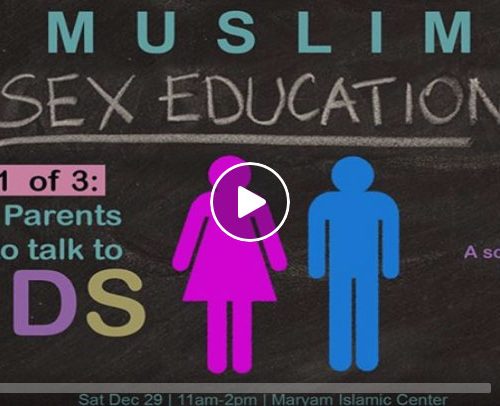-
Live Classes
$50.00
-
Marriage Prep
$50.00
Questions
CLICK HERE for video response.
The scholars’ 2 OPINIONS:
1) NO SHE CANNOT STAY IN THE MASJID UNLESS PASSING BY FOR A NEED (MAJORITY)
Evidences:
-The junub (sexually impure person after intercourse) is told explicitly in the Quran (Nisa: 43) not to stay in the masjid. And the junub, by analogy, is similar to the menstruating women because they both have an impurity that requires ghusl.
– Rasulullah (S) said to tell all women (menstruating and not) to come to the Eid prayer, but he said “let the menstruating women avoid the prayer place.”
-Rasulullah (S) in said, “The mosque is not permitted for menstruating women or anyone who is in a state of janabah (sexual impurity).”
2) YES SHE CAN STAY IN THE MASJID
(minority opinion held by Ibn Hazm, Al-Muzani a scholar of the Shafi’I madhab, Dawud Ad Dhaahiri, and modern day scholars such as Shaykh Yusuf al Qardawi and others)
Evidences:
-The hadeeth mentioned above (“The mosque is not permitted for menstruating women or anyone who is in a state of janabah (sexual impurity).”) was classed as da’eef (weak) by Shaykh al-Albaani as well as other scholars, so it is not permissible to make a ruling of fiqh based on a weak hadth.
– The ayah talking about the junub cannot be applied to the menstruating women because they are not analogous.
When Aisha is on her period during Hajj, Rasulullah (S) told her “do everything but don’t do tawaf of the kabah” which indicates she could stay at the Kabah and do worship, dua, etc.
-A slave woman who was freed set up a tent and lived in the masjid. And Umm Mihjaan (the caretaker of the masjid) would regularly take care of the masjid, and was not told to avoid it during menses.
-Therefore, these scholars are of the opinion that if it were really impermissible for a woman to not stay in the masjid, there would be an authentic direct hadith or ayah about it, as women around the messenger regularly had their period. The evidences brought by the majority are not strong enough to make it haram upon her to stay in the masjid.
CLICK HERE for video response.
Did you know that the wives of the Prophet (S) traveled together WITHOUT a Mahram from Madinah to Makkah to make Hajj?
In short – there are two opinions on the matter. 1) No, she has to have a Mahram. 2) Yes, she can, as long as her safety can be ensured, and that she uses safe public transportation where others are around.
CLICK HERE for video response
Rasulullah (S) said “Whoever fasts during the month of Ramadan and then follows it with six days of Shawwal will be (rewarded) as if he had fasted the entire year.” [Muslim]
So CAN I DO 6 SHAWAL BEFORE MY RAMADAN MAKE UP FASTS?
2 Opinions of the scholars:
1) NO, FINISH RAMADAN FASTS FIRST: Some scholars, amongst them the Hanbalis, say that one must finish the obligatory fasts of Ramadan first before you do any other voluntary fast, as obligations are more important than voluntary fasts and because the Hadith says “Whoever FASTS Ramadan and follows it up with 6 of shawal…” indicating one must finish all 29/30 of Ramadan first and foremost. Some of this group say, if one cannot do all of Ramadan make up fasts in Shawal, then they can complete their 6 Shawal in the next month (Dhul Qa’dah).
2) YES, YOU CAN DO 6 SHAWAL BEFORE RAMADAN MAKE UPS:
The other opinion of scholars (amongst them the Hanafi, Shafi, Maliki madhhab) is that the obligation of finishing off Ramadan is an obligation that is given an extended amount of time to fulfill. So since it is given a wide time of 11 months to finish the Ramadan fasts, it should NOT be limited to finishing them off in the very next month (shawal). Shawal is a limited amount of time, and Ramadan is given a long time, and therefore it would be permissible to fast 6 shawal first as long as the Ramadan fasts are accomplished throughout the next 11 months. This is from the mercy of Allah in giving us a long time to make up all the Ramadan fasts.
The precedence that we have in the seerah, is that of Aisha (R) who said that she regularly made up her Ramadan fasts in the month of Shaban, which is the month right before Ramadan. But it is also known that she did many voluntary fasts throughout the year. Scholars conclude that she thererfore saw it acceptable to do voluntary fasts, EVEN though the Ramadan make up fasts had not been completed yet.
It is also very difficult for women to make up Ramadan fasts (maybe 7-8 days) & finish shawal (another 6 days) within one month – because obviously her menses will come (maybe 7-8 days). That almost requires her to fast another WHOLE month minus her period just to accomplish Shawal. And that is definitely a great difficulty.
**Majority of scholars say you cannot combine Shawal and Ramadan make up fasts with one intention. They should be separate intentions and separate days.
NOTE: Know yourself! If you find it difficult to make up your fasts, PRIORITIZE Ramadan fasts over Shawal fasts, because an obligation is like a debt!
May Allah allow us all to fast the 6 of Shawal to get the reward of an entire year! Ameen
CLICK HERE for video response.
RECITING QURAN – there are 2 opinions:
1) She CANNOT read/recite the Quran.
Most scholars prohibit women from touching the Quran based on the hadith “The menstruating woman and the one who is in a state of sexual impurity (janaabah) should not recite anything of the Qur’aan.”
2) She CAN read/recite the Quran.
This is the opinion of Ibn Taymiyyah, ibn Qayyim, Imam Malik, Bukhari, and one opinion of Imam Ash Shafii as well as many other scholars. Their argument is that the hadith mentioned above is Daeef (weak). In fact, the hadith is considered weak by almost all scholars of Hadith and therefore cannot be used in order to make a fiqh ruling. So women may recite or read the Quran, either from memory or from the Quran mushaf (book) itself.
TOUCHING THE QURAN
Scholars of fiqh agree that someone who is not purified CANNOT touch the Quran because Allah says in the Quran “None shall touch it except the purified” (Waqiah: 79). This includes the junub (sexually impure), the menstruating woman, as well as someone without wudhu.
So how can she read the Quran?
1) Use a barrier (glove, towel, pen) so that her hand doesn’t directly touch the Quran
2) Read it off of a tablet or phone as these are not considered the Quran, but rather devices that have the Quran in them.
3)Read a book which has Tafseer/translation in it – as that is not considered the Quran mushaf (book) either. Even if it contains the Arabic, if half is tafseer/translation, it is permissible for an impure person to hold.
CLICK HERE for video response.
Q:If you fast all day, and your period starts a few minutes before Maghrib, do you have to make that day up?
A: Yes.
Q: If I didn’t make up all my fasts before next Ramadan, what do I do?
A: If you had no excuse, you have to pay the penalty, Fidya as well as make them up later. (Fidya: feeding a poor person a full day’s meal per day that you missed).
Q: Do pregnant and breastfeeding women have to fast?
A: They are exempt if they fear for themselves or the baby. However, if they feel well enough, they can fast, after consulting a doctor.
Q: How do pregnant/nursing moms make up those fasting days if they have years of make ups?
A: There are multiple opinions of scholars:
1- make them all up over the years (majority opinion)
2- pay the fidya only (opinion of Ibn Abbas and Ibn Umar (R))
3- pay the fidya AND make them up over the years
Connect With Us
2 days ago
2 days ago
1 week ago
1 week ago
1 week ago
About 24 Hours Ago
This past Ramadan, the community showed a lot of generosity and helped us raise enough funds to grant 15 scholarships for #SuhbahSeminary. http://bit.ly/2nG9rH2


